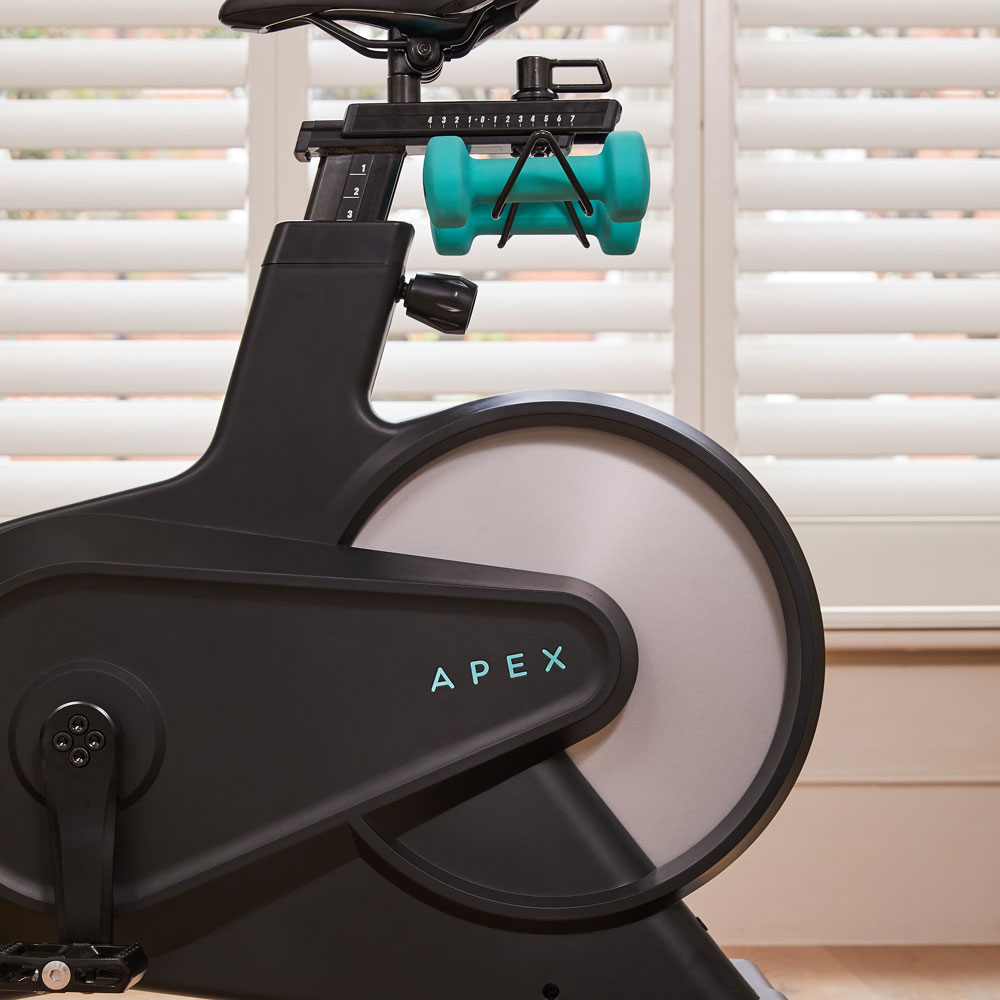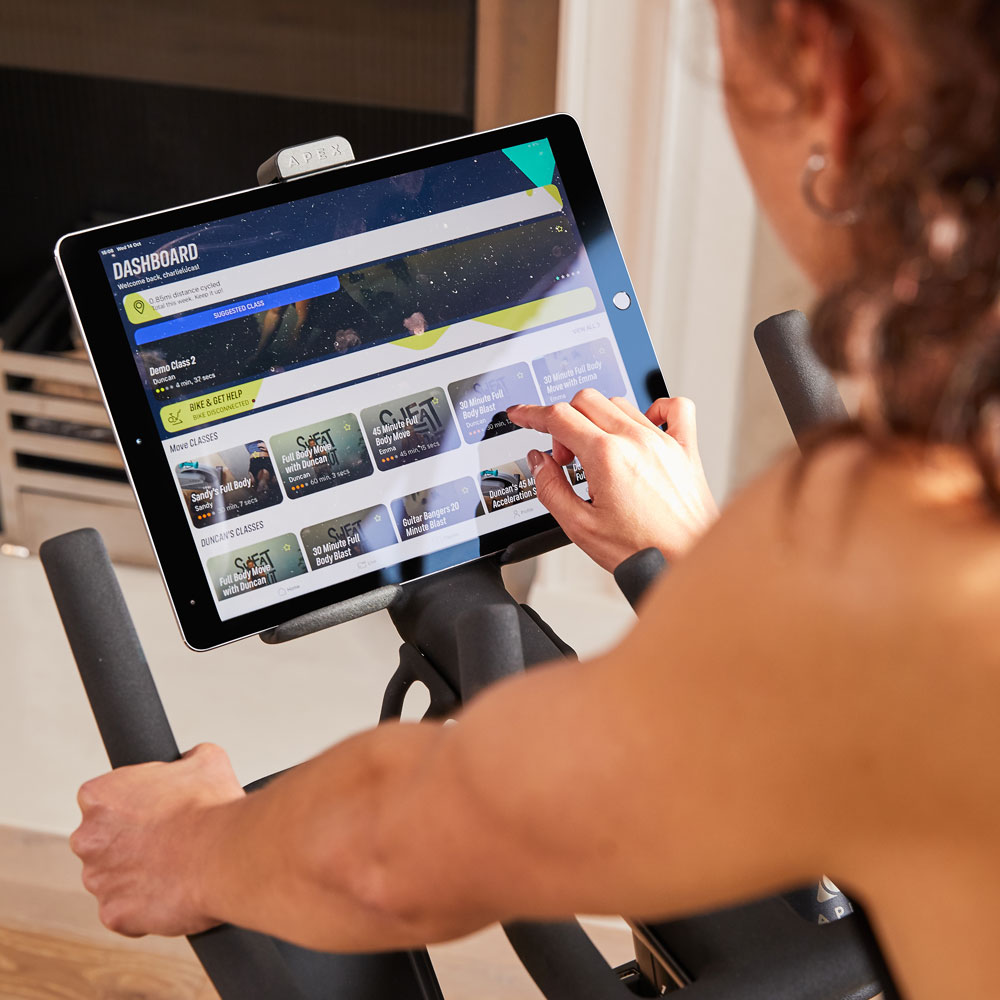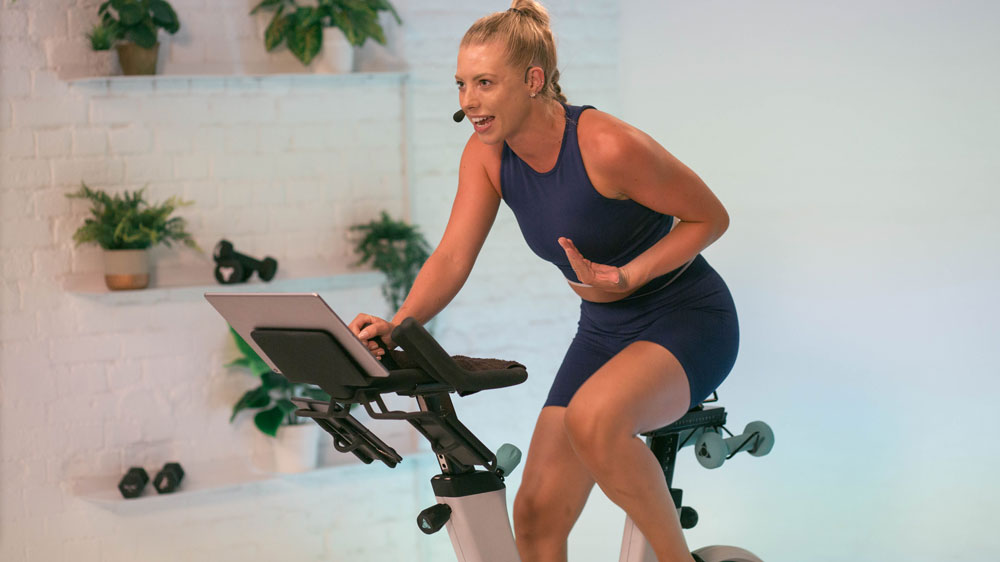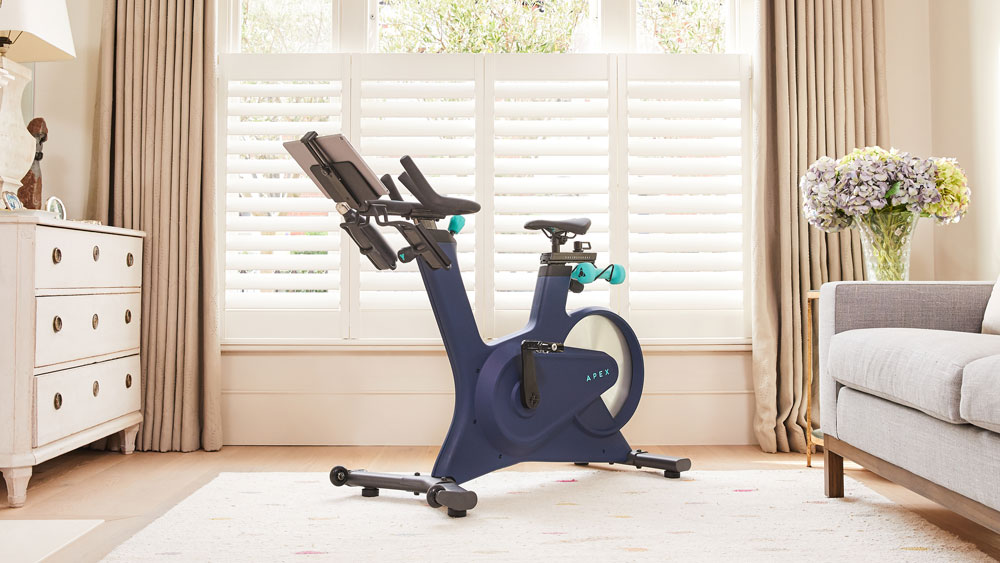Our Verdict
The Apex bike is more affordable than most spinning bike-plus-app combos and offers a good experience for at-home classes, even if both the bike itself and the partner app fall a little short of the standards set by the likes of Peloton, Echelon and Technogym.
For
- Connects to partner app for workouts
- Easy to move bike around
- Cheaper than many home spinning options
Against
- Lightweight flywheel
- No built-in screen
- App less impressive than rivals’
You can trust Coach
Given that the Peloton Bike system is both very successful and very expensive, it’s no surprise rivals have emerged with similar offerings at a more affordable price.
British brand Apex is the latest challenger hoping to claim the title of best home spin bike, and not only is the bike itself cheaper than the Peloton (£1,200 compared with £1,750 for the cheaper of the two Peloton bikes) but so is the app subscription, which is £30 rather than £40.
Of course Apex isn’t only going up against Peloton: other brands like Echelon offer connected spinning bikes, and there are also class-only services like Apple’s Fitness+, which can work with any bike. You’ll also find connected options in our best exercise bikes round-up which try to recreate the experience of road cycling.
The Set-Up
Installation and assembly is included in the cost of the Apex, so that’s no trouble at all (although this might result in delays if home assembly isn’t allowed under current COVID-19 restrictions). The bike is fairly attractive and doesn’t hog too much space, with a footprint of around 120cm by 60cm.
The flywheel is notably lighter than that on the competition at 4kg, which Apex says makes it easier to move the bike around and provides a smoother ride. While I’m not sure the ride is smoother than on the bikes with heavier wheels I’ve tried, I found that the resistance range on the Apex was more than enough to challenge me, and the bike didn’t get too jumpy even on high-intensity intervals when I was out of the saddle.

There is no built-in screen on the bike as on Peloton: classes are viewed on your own tablet or phone in the handlebar-mounted holder. There’s a USB socket on the handlebars for charging your device, and a second phone holder, below the main one and opposite the water bottle holder, that even offers wireless charging. It’s worth nothing that only iOS devices are supported at the moment, though Apex intends to launch the app on Android in 2021.
The magnetic resistance is controlled by a dial, which allows you to scroll through the 30 levels available. This dial is not very good, to be blunt. It clicks as you turn it but those clicks don’t match the levels available. I often turned it without the resistance changing, then turned another click only for the resistance to jump two levels. It’s fiddly and annoying to use during HIIT workouts where you’re trying to change the resistance quickly to match the instructions given.
The Experience
As with Peloton and Echelon, the real appeal of the Apex bike is found in the partner app, where there are over 150 on-demand classes to try. These are all spinning – rival apps offer various other types of workout off the bike too – and there are no live classes as yet, though these are due to arrive in February.

You can filter the classes by length – they range from 15 minutes to an hour – instructor, music genre, whether the workouts include sections with free weights (which are not included; Apex sells a pair of 2kg dumbbells for £25), and difficulty, with four levels available. The classes are also divided into two overall categories: metric is dictated by stats, while move is just about working up a sweat to music.
Once you start a class you can see the stats from your connected bike on screen. Power, cadence and resistance are displayed along with the current suggested cadence and resistance level ranges from the instructor. I found these mostly mirrored the instruction given, but in most classes I tried there were a couple of small errors in the on-screen instructions, so you do need to pay attention to what the instructor is saying.
As with all of these spinning apps, I found some instructors and their motivational techniques pretty unbearable, but I was able to find a couple on Apex that did suit me. I will say that I am not a spinning class devotee and think singing along to the music while staring down the camera should be illegal. But overall the instructors, who hail from London spinning studio Boom Cycle, do a good job of explaining what you need to do during the classes and providing the motivation to ensure you do so.

During the class, a leaderboard on the side of the screen (which you can hide should you so wish) shows how you rank compared with other people who have taken the class. This is based on Apex points, earned throughout the class depending on your effort. It’s another way to motivate yourself if you happen to be competitive, like me.
There is no free ride option on the bike at the moment, but it is something Apex is planning to add. That means the connected experience is restricted to the spinning classes for the time being, but since that’s the main reason to buy the bike, it’s not a huge problem.
After a class you get a breakdown of your stats, which can be shared to activity tracking app Strava or other social media platforms.
Verdict
The Apex Bike does a good job of offering a Peloton-lite service and I’ve few complaints about the bike itself aside from the unco-operative resistance dial. The app is a little light on classes and ride options compared with Peloton and Echelon, but that should improve in time and the £30 monthly subscription is significantly cheaper than the Peloton and Echelon apps.
The Peloton experience is undoubtedly better. That’s down to the quality and range of the classes, and having these displayed on the huge built-in screen makes them more immersive. However, the saving you make by opting for the Apex is substantial, and I’d rather have the money in my pocket and use (or even buy) a tablet.
However, there are cheaper options still. The cheapest approach is to buy a basic spinning bike – you can get very good ones without connectivity for £500-£600 – and then find classes to follow elsewhere, whether that’s free sessions on YouTube or through a service like Apple’s Fitness+, which costs £10 a month (Apple Watch owners only). I tried an Apple Fitness+ spinning session on the Apex bike and although you don’t see your stats on screen during it since the bike isn’t linked, the experience was still pretty similar to what you get from the connected app because spinning mostly just involves turning a resistance dial and adjusting your effort in line with instructions.
Even if you’re all about connected services, Echelon now has the Connect Sport bike which costs £799.99. The Echelon app costs more than Apex’s but there’s no doubt it’s superior, with more classes and ride options.
The Apex Bike is undoubtedly a good alternative to Peloton, and the lower monthly subscription cost in particular is welcome, but the Peloton experience still reigns supreme. And if you’re looking for a bargain option for home spinning there are cheaper ways to go than the Apex.
Buy from Apex | £1,200 (bike), £30 monthly unlimited classes

Nick Harris-Fry is a journalist who has been covering health and fitness since 2015. Nick is an avid runner, covering 70-110km a week, which gives him ample opportunity to test a wide range of running shoes and running gear. He is also the chief tester for fitness trackers and running watches, treadmills and exercise bikes, and workout headphones.

